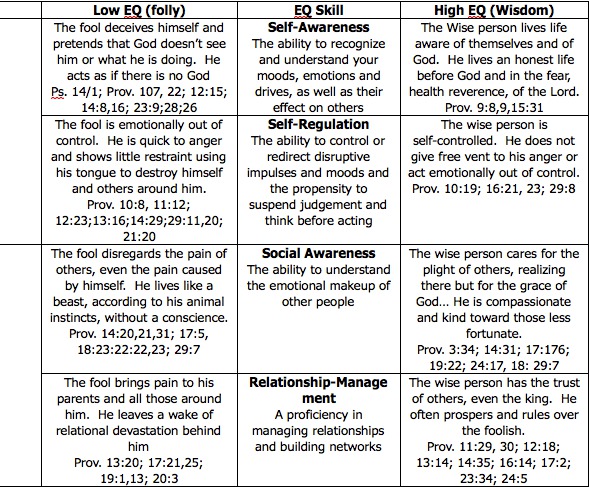What Does Emotional Intelligence Have To Do With A Replanter’s Leadership Development And Effectiveness? Is Emotional Intelligence Biblical?
In our last post, we introduced a critically important leadership concept that often makes or breaks the ministry of a replanter: Emotional Intelligence (EQ).
What we know is that ministry is about people. Replanting a church is about people. Understanding, relating to, and caring for all different types of people created in the image of God. According to Daniel Goleman in his book Emotional Intelligence there is no better indicator for success in relationships than one’s emotional intelligence.
In the book Cultural Intelligence: Living and Working Globally, we are told that, “Many organizations regard social skills or interpersonal skills as key qualifications for new employees. Upward of 70% of most mangers’ time in most cultures, is typically spent in interaction with others-superiors, subordinates, peers, clients, and others”. Talentsmart recently tested EQ alongside 33 other important workplace skills and found that emotional intelligence is the strongest predictor of performance, explaining a full 58% of success in all types of jobs. This study also went on to show that 90% of top performers are high in their emotional intelligent competencies. Daniel Goleman summed it up best when he wrote, “If your emotional abilities aren’t in hand, if you don’t have self-awareness, if you are not able to manage your distressing emotions, if you can’t have empathy and have effective relationships, then no matter how smart you are, you are not going to get very far.” What truth and wisdom this is for the replanting pastor to apply to his life and ministry.
I can hear someone saying at this point, “This sounds all fine and good, but is all of this EQ stuff Biblical?” That’s a good question and one that should be asked by any theologically minded leader and replanter. Throughout the Bible, divine wisdom with regard to the concepts and skills found within EQ are addressed time and time again. For example, the comparison between the fool and the wise man found in the book of Proverbs (see table below from Andy Johnson, “Emotional Intelligence is Biblical Wisdom”), at its core, include the elements and competencies found in emotional intelligence. Paul’s writing in the book of Romans, chapter 12, and the admonition to be transformed by the renewing of our mind is a key skill at the very foundation of improving ones EQ. Additionally, we see in Galatians, chapter 5, Paul’s advice to no longer live by the old flesh but rather live and walk by the Spirit speaks directly to EQ. Again, our ability to grow and mature into Christ-likeness through the power of the Spirit, specifically as we relate to and care for others, can be found in the skills learned through improving ones emotional intelligence.
The following chart from Andy Johnson’s “Emotional Intelligence is Biblical Wisdom,” is a helpful tool in better understanding how the four key areas of EQ (self-awareness, self-regulation, social awareness, and relationship management) relate to the wise and foolish man in the book of Proverbs:

EQ is a discipline, just like working out, reading ones Bible or diet. Donald Whitney in his book, Spiritual Disciplines for the Christian Life says, “discipline without direction is drudgery.” For the replanting pastor, disciplining oneself in the skills of emotional intelligence is a means for setting a course to greater personal holiness, more God honoring actions, attitudes and relationships with others.
In Colossians 3:12 we read, “Therefore, as God’s chosen people, holy and dearly loved, clothe yourselves with compassion, kindness, humility, gentleness and patience. Bear with each other and forgive one another if any of you has a grievance against someone. Forgive as the Lord forgave you. And over all these virtues put on love, which binds them all together in perfect unity.” At the end of the day the leadership skills rooted in developing greater emotional intelligence can serve as a road map to be more compassionate, kind, humble, gentle and patient. These are key character qualities for effectiveness in replanting ministry and leadership. Much of the wisdom found in developing EQ serves as a guide to understand our emotions and their root cause in order that we can be quick to forgive, strive for unity and ultimately be more loving.
Time to reflect:
#1 Observe the shock wave effect of your emotions on others. Often our inability to recognize our emotions and the shock waves that resonate from these emotions can have devastating consequences on our relationships. Begin to identify how your emotions and the way you handle your emotions can send shock waves that result in a negative impact on others.
#2 Be an emotional detective. It is easy to say, “I’m angry, sad or worried”. These are words we use to quickly describe how we might be feeling but these words have the ability to mask what is really going on at a deeper level emotionally. Very few people are able to express themselves at this deeper level. Yet, if we desire to grow in our emotional intelligence as replanters, it will become critical for us to develop this technique of becoming an emotional detective. For example,
One might say they are angry or frustrated but as they probe deeper the real emotion is a sense of not being in control of others, the situation or their environment. Once properly identified, these unhealthy emotions can be confessed as we now take a proper posture of surrender and submission to our great God.
One might say, “I feel sad or discouraged”. However as they dig deeper what is really at hand is a need for affirmation and recognition. Now this unhealthy need of human praise can be challenged by asking, “Am I seeking man’s approval or God’s”.
One might say, “I’m scared, worried or fearful”. What might really be at hand is an inability to accept change or perhaps not everything went exactly according to their plan. Now this destructive thought pattern can be handed over to God as we acknowledge He is in control of all things and is our sovereign Lord.
Published December 10, 2015


